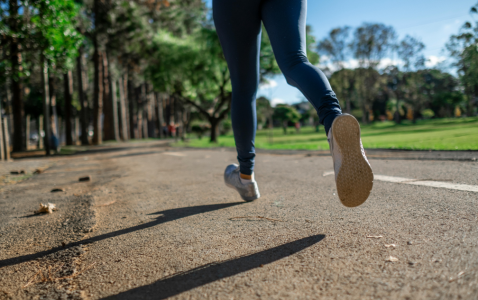Unlock the secret to better memory with just 30 minutes of this daily activity, researchers reveal!
By
- Replies 0
Maintaining a sharp memory becomes a priority for many in the over-60s community as we age. We often turn to puzzles, brain games, and even dietary changes to keep our minds agile. However, a recent study from University College London has revealed a simpler, more accessible way to boost cognitive performance: just 30 minutes of moderate to vigorous physical activity each day.
The study, which is music to the ears of those who enjoy a morning cycle or a brisk walk, suggests that exercise improves our physical health and directly impacts our brain function, particularly memory. This is a significant finding for seniors looking to enhance their cognitive abilities and protect against age-related decline.
According to Dr Mikaela Bloomberg, the study's first author, combining physical activity and a good night's sleep of at least six hours can improve cognitive performance the following day. 'The takeaway is just [that] physical activity is good for your brain, and good sleep helps that,' she explains.
The research team delved into the short-term impact of physical activity in real-life situations rather than laboratory settings. They tracked 76 adults aged between 50 and 83 who did not have cognitive impairment or dementia. Participants wore accelerometers for eight days to monitor their sleep and physical activity throughout their daily lives. They also completed daily online cognitive tests to assess their attention, memory, and processing speed.
The results were promising. Each 30-minute increase in moderate to vigorous physical activity from the previous day corresponded to a 2-5 per cent increase in episodic and working memory scores the next day. Interestingly, while both types of memory improved, the increase in working memory scores remained significant even after considering participants' sleep data.
This study is particularly relevant for our Seniors Discount Club members, highlighting a practical and enjoyable approach to enhancing memory. It's encouraging to know that activities such as gardening, swimming, or even dancing can have a positive effect on our mental faculties.
However, it's important to note that the study does have its limitations. The participants were generally well-educated, in excellent health, and already engaged in high physical activity levels. The findings may not universally apply to all seniors, especially those with different lifestyles or health conditions.
Despite these limitations, the study's implications are clear: incorporating physical activity into our daily routine can be a powerful tool in the fight against cognitive decline. It's not just about the long-term benefits but the immediate boost to our brain's performance.
So, dear members, let's lace up those walking shoes, dust off the bicycle, or find a dance partner! Not only will we be taking care of our bodies, but we'll also be nurturing our minds. And remember, there is always time to start. Whether you're a seasoned exerciser or just beginning to explore the world of physical activity, every step counts towards a sharper memory.
 We'd love to hear from you in the comments below. Have you noticed memory or cognitive function improvements after starting an exercise routine? What are your favourite ways to stay active? Share your experiences and tips with the community, and let's inspire each other to keep moving for our own sake!
We'd love to hear from you in the comments below. Have you noticed memory or cognitive function improvements after starting an exercise routine? What are your favourite ways to stay active? Share your experiences and tips with the community, and let's inspire each other to keep moving for our own sake!
The study, which is music to the ears of those who enjoy a morning cycle or a brisk walk, suggests that exercise improves our physical health and directly impacts our brain function, particularly memory. This is a significant finding for seniors looking to enhance their cognitive abilities and protect against age-related decline.
According to Dr Mikaela Bloomberg, the study's first author, combining physical activity and a good night's sleep of at least six hours can improve cognitive performance the following day. 'The takeaway is just [that] physical activity is good for your brain, and good sleep helps that,' she explains.
The research team delved into the short-term impact of physical activity in real-life situations rather than laboratory settings. They tracked 76 adults aged between 50 and 83 who did not have cognitive impairment or dementia. Participants wore accelerometers for eight days to monitor their sleep and physical activity throughout their daily lives. They also completed daily online cognitive tests to assess their attention, memory, and processing speed.
The results were promising. Each 30-minute increase in moderate to vigorous physical activity from the previous day corresponded to a 2-5 per cent increase in episodic and working memory scores the next day. Interestingly, while both types of memory improved, the increase in working memory scores remained significant even after considering participants' sleep data.
This study is particularly relevant for our Seniors Discount Club members, highlighting a practical and enjoyable approach to enhancing memory. It's encouraging to know that activities such as gardening, swimming, or even dancing can have a positive effect on our mental faculties.
However, it's important to note that the study does have its limitations. The participants were generally well-educated, in excellent health, and already engaged in high physical activity levels. The findings may not universally apply to all seniors, especially those with different lifestyles or health conditions.
Despite these limitations, the study's implications are clear: incorporating physical activity into our daily routine can be a powerful tool in the fight against cognitive decline. It's not just about the long-term benefits but the immediate boost to our brain's performance.
So, dear members, let's lace up those walking shoes, dust off the bicycle, or find a dance partner! Not only will we be taking care of our bodies, but we'll also be nurturing our minds. And remember, there is always time to start. Whether you're a seasoned exerciser or just beginning to explore the world of physical activity, every step counts towards a sharper memory.
Key Takeaways
- Thirty minutes of moderate to vigorous physical activity, paired with at least six hours of sleep, has been associated with improved cognitive performance the following day, a study from University College London suggests.
- Researchers found that each additional 30-minute increment in such physical activity was linked to a 2-5 per cent increase in memory scores. However, the impact on working memory remained even when sleep data was considered.
- Sedentary behaviour was associated with a slight decrease in working memory scores, while sufficient sleep was shown to enhance various cognitive functions, including episodic memory and attention.
- The study highlighted everyday implications for maintaining cognitive functions as we age but also acknowledged limitations, including a homogenous participant group with high levels of education and health. Further research is aimed at understanding the impact on people with cognitive impairments.








